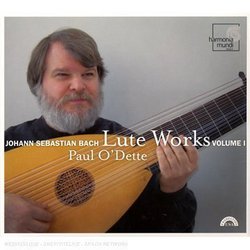Exquisite Bach lute music
Mike Birman | Brooklyn, New York USA | 11/13/2007
(5 out of 5 stars)
"There is a bit of a mystery surrounding Bach's 'lute' music. It simply cannot be played on any standard 13-course lute available in 18th Century Germany. And since he notated his 'lute' pieces in staff keyboard notation and not lute tablature, his intentions are open to interpretation. What Bach may have had in mind requires informed guesswork. If we begin with Bach, himself, any theory must take into account his affinity for abstraction. He could (and did) compose music with no specific instrumentation in mind, The Art of Fugue a prime example. When a specific task or commission is not at stake, he seems to compose music in its absolute sense, leaving musicians to handle performance issues, such as instrumentation, voicings, transposition. 18th Century performers were often jack-of-all-trades, capable of meeting Bach's musical demands, and Bach had no reason to believe that this would change in the future. Another mystery is whether Bach played the lute, himself. Given his universal musical genius, it is likely he knew his way around the instrument without being a virtuoso. There is evidence he gave lute instruction to one of his students, Johann Ludwig Krebs. And he wrote significant lute parts into his St. Matthew and St. John Passions.
What seems to validate the absolute theory is the fact that Bach loved the lute enough to have designed a gut-strung harpsichord, called the Lautenwerk, with a sound that so resembled the lute, it 'deceived the ears of the best lutenists.' Described as the most beautiful of all sounding keyboards, after the organ, because of its ability to emulate the lute, the one complaint was that it was incapable of producing soft and loud sounds as the lute can do. 'It must always be played quickly and arpeggiated as we usually hear skilled lutenists do....' The nature of Bach's 'lute' works indicates that they were composed at the Lautenwerk, a unique instrument, to be played as the performer saw fit.
Paul O'dette uses a 13-course lute by Andrew Rutherford, New York, 2002, after an instrument built by Sebastian Schelle in 1727. He transposes the Pieces pour la luth a Monsieur Schouster, BWV 995 (an arrangement of the C minor Cello Suite, BWV 1011), from G minor to A minor, allowing the piece to be played on a 13-course lute exactly as written. Both of the following 'lute' pieces are Bach reworkings of Partitas and Sonatas for solo violin: the Partita in E major, BWV 1006a (transposed to F major) and the Sonata in G minor, BWV 1001. Bach often played his violin pieces on the clavichord, adding whatever harmonies he thought necessary. The reworkings presumably convinced Bach that there was an abstract harmony not achievable on the violin but possible on the Lautenwerk, with extra bass notes and chords. These found there way into the 'lute' pieces.
O'Dette's playing is elegant and precise, his touch feathery (there is an almost complete absence of noise as he negotiates the strings). His phrasing is impeccable, his use of the lute's wide dynamics serves to articulate each phrase as if emulating the human voice. The more vivacious dances are jaunty and joyful. The inner directed, ruminative movements are soulful, even ethereal, and seem to stop time. Each suite is its own abstract, beautiful world that O'Dette brings to life with nearly flawless technique. His artistry makes this disc, the first volume in an apparent Bach lute series, an important addition to the collections of those who love Bach and the Baroque, and lute and/or string instrument aficionados. The recording sounds warm and clear, with the lute recorded in the middle distance, and nice acoustic reverberation surrounding each note.
This is a splendid recording, worth the investment. Most strongly recommended.
"
Bach's music should "dance" and Paul O'Dette makes it do so
Laraine A. Barker | New Zealand | 10/20/2008
(5 out of 5 stars)
"These are not officially works for lute. The first item, BWV995, is an arrangement of the C-minor Cello Suite, BWV 1011; the second item, BWV 1006a, is the Partita for solo violin BWV 1006; and the final Sonata was also written for solo violin. I have a few problems with the solo violin works, especially on a modern instrument on which it isn't easy to play three-note chords without using too much force on the bow. They fare a lot better on a baroque violin (as long as the violinist has excellent intonation) but for me the music falls more sweetly on the ear in these lute versions and I doubt any lutenist could play them better than Paul O'Dette. The music positively dances under his nimble fingers and Volume 1 of his Bach works makes me long to own the rest of the set."
The lute works
Daniel Suarez | 03/25/2008
(5 out of 5 stars)
"The CD sound is superb. I'd describe it as airy. I liked the interpretation which reminded me more of Sharon Isbin's embellishments and use of silence than the more mechanical play of John Williams. I'm glad I have it in my collection."

